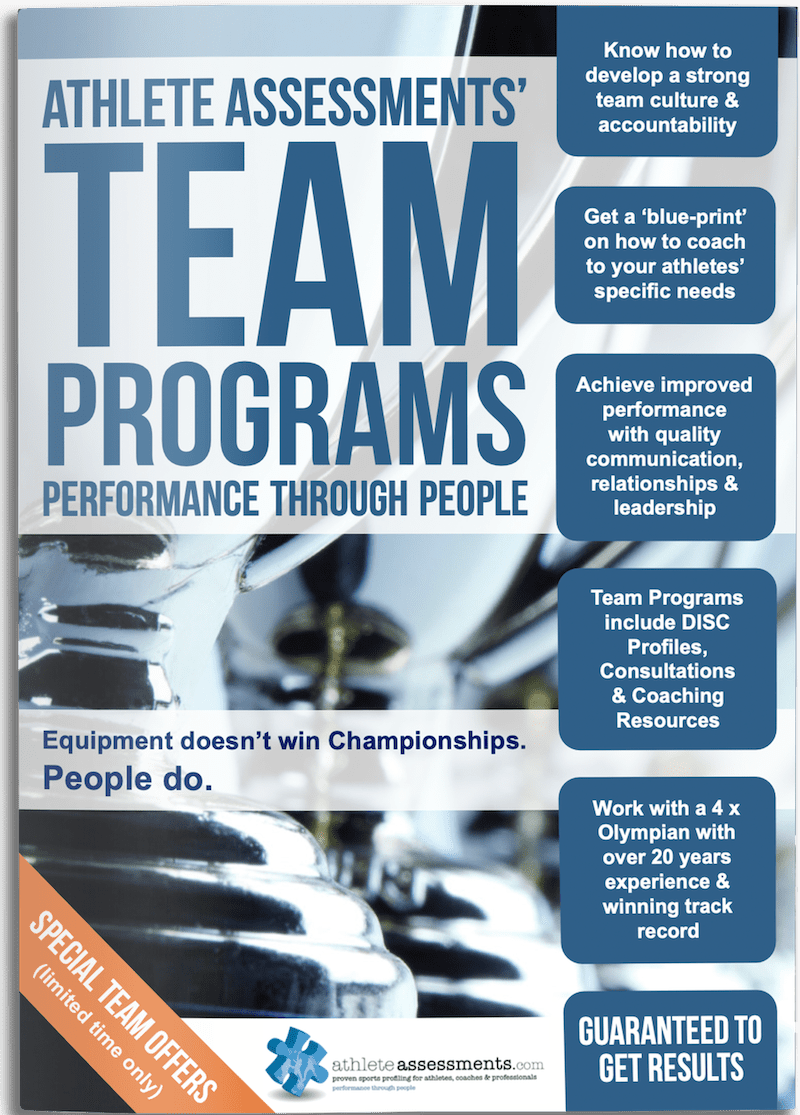What is Athlete Engagement?
Athlete Engagement is a critical concept for all sports coaches to understand. “Engagement” is a borrowed term from the business world. There, it is a measurement of the degree to which an employee’s heart and mind is committed to their role, leader and company. It is so important in business because engagement has a direct and significant link to profitability. Research shows engaged individuals deliver an additional 30% in discretionary effort compared to disengaged individuals.
Given business and sport both strive for optimum performance and similar team structures exist in both fields, we believe the concept of engagement is just as important for the sporting world as it is to the business world. In sport, forget about 30% extra effort from your engaged athletes and consider what difference just 1% would make to your athlete’s or team’s performance. I know the value of 1%, I have lost Gold Medals by less than 0.5%.
Anecdotally, every coach knows that committed, self-motivated and enthusiastic athletes generally train smarter, harder and more consistently than those athletes who lack these qualities. The performances and results from those athletes who have these qualities are consistently better. Engaged athletes, the ones whose hearts and minds are committed to their sport, their coach and their team, give their best in training and competition and absolutely achieve better results.
Did you know creating engaged athletes is a coach’s primary responsibility? Coaches achieve higher levels of engagement by creating an environment and culture where athletes are rewarded, recognized and valued for being self-motivated, committed and enthusiastic. The behaviors we want are athletes taking personal responsibility for their performances and seeking ways to improve on their own initiative. As coaches, we don’t want to be constantly pushing them, telling them the same instructions time and again, or having to manage their life outside of sport.
Watch Bo Hanson speak about Creating Athlete Engagement
Treat People as Individuals – Flexible Leadership
In the business world, research shows that 70% of engagement is linked to the atmosphere that the team leader creates. This atmosphere is created through their ability to be flexible with their leadership style.Having flexibility includes treating their people as individuals (valuing their differences) and engaging the type of leadership style that is required given the individuals involved, the varying circumstances and situation.
In sport, this is exactly the same. Coaches are to learn how to develop flexibility with their coaching style if they are to appeal to their athletes’ individual needs. We call this, Athlete Centered Coaching. When the coaching (or leadership) style is incorrect for the given individual and situation, then disengagement eventually occurs. Remember a time when a coach you had, did not treat you in a way that you required? For example, consider a highly experienced athlete with their own ideas and techniques being simply directed by their coach what, when and where to do things (instead of their coach working with them and their ideas). How do you imagine this would make the athlete feel? Have you ever seen an athlete leave a coach because they would not listen to their suggestions and ideas? Plenty of athletes have, and in my time as an elite athlete who has won three Olympic Medals, I have changed coaches and seen others do the same.
In the business world, there are strong statistics that show engagement declining with length of tenure. Once again, we have probably all felt this way at some stage about our employment and anecdotally this makes so much sense. Employees start their jobs enthusiastically. Should they receive the incorrect leadership style (which shows disrespect for their abilities and a total lack of understanding of them as people) in addition to not receiving basic encouragement, feedback and support to learn and grow, they very quickly become disillusioned and ultimately become disengaged. Soon enough they either leave or worse still, stay and just do the minimum required or worse still, they sabotage team efforts. Translating this to sport, have you seen athletes who fit into this description? Preventing an athlete from disengaging is about treating athletes as individuals according to their specific needs. This is not rocket science. It does however require the coach to understand themselves and their preferred coaching style. It also requires the coach to understand their athletes to the same degree. A large part of the athlete engagement equation rests with the coach as the leader of the athletes and team.
Studies of the US job market in business, estimate it costs their economy about US$300 billion a year with 17 per cent of employees being “actively” disengaged. These employees each cost their employers an average of US$13,000 a year in lost productivity. What is the equivalent in the sporting world and what is the equivalent for your athletes and team? I know that in my rowing career, a disengaged crew member cost us in the following ways:
- Turns up late or not at all
- Is unprepared physically and mentally for the training session
- Does not get involved in team discussions
- Does not make changes to their technique and the coach’s time is absorbed to the detriment of other team member needs
- Slackens off at training even where it is obvious such as gym where weights are measurable
- Leaves straight after training finishes without socially chatting with the team
- Does not get involved in team social activities
- Impacts the mood and environment of training and competition
The list goes on…
Can you think of any others as they apply to your sport?
The Cost of Athlete Disengagement
In business, the cost is financial. The bottom line in sport is, a disengaged team member costs everyone in sport much more than money. I cannot buy a gold medal. You cannot buy the premiership. Your athletes cannot buy better technique. In sport, many of us get involved and compete because we love it. I rowed at four Olympics because it was my passion. There was nothing I would rather have been doing. To be rowing with a disengaged crew member, and it did happen, cost me results that money could not buy.
Just before my second Olympics I found an amazing coach who had the ability (before anyone even spoke about this stuff) to create an engaging environment and team atmosphere. He was for me, and still is for others who he now coaches, someone who you wanted to do your best work for. I wanted to win medals for me, for my team and for my coach. My coach wanted us to win for us and us only. He never pressured us to win for him. I know of coaches who told their athletes to win for them. I saw the results of this. Eventually their athletes left (some to come and row with my coach!) and unfortunately some left the sport altogether.
Think about Athlete Engagement and consider your role, your true role, as a coach. Athletes are engaged or become disengaged for a reason — it’s a response to the way their training and competition environments are structured and even more importantly, the way they are being coached. Ultimately, how well do you know yourself and your athletes? If there is a chance you could improve this, even if only by a few percent, it is worthwhile. How much money gets spent in sport in the attempt to improve by a few percent? The good news is the opportunity to know yourself and your athletes to a level previously not possible (or possible within a reasonable time frame) is available with the use of Athlete Assessment’s AthleteDISC and CoachDISC profiles.
Where to from here?
Discover more information about the AthleteDISC profile for athletes and CoachDISC profile for Coaches. Or contact us to find out how we can help you further develop your coaching.
Get practical strategies to coach athletes to their individual needs. Know the behaviors producing their best performances for greater consistency when it counts the most. Help your athletes build self-awareness to make improvements and take greater responsibility for their behavior, on and off “the field”. Find out more!
The distinguishing factor of great Coaches is their constant pursuit for the competitive edge, in their athletes and themselves. Coaches will better understand their coaching styles (and their fellow-Coaches’ and staff) to find new ways to further improve their coaching and communication with athletes and others. Their coaching results will only further improve, guaranteed! Find out more!
Provide your people with a comprehensive understanding of themselves and those they work with. It quickly improves communication, working relationships and ultimately results. Use with recruitment, as a foundation for professional development plans or part of a team building exercise. Find out more!










1 thought on “Athlete Engagement in Sport – Do Your Athletes Care?”
I will start by saying, I am proud to be part of Fiery Falcons champions team! All the events were well planned & organized. Nilesh you are an amazing captain with lot of Passion, Enthusiasm & you always there to support & motivate the team members.
Thanks a lot for including Me and welcomed Me to Fiery Falcons champions team.
I am really proud to be one among you all.
Thank you
Chandru